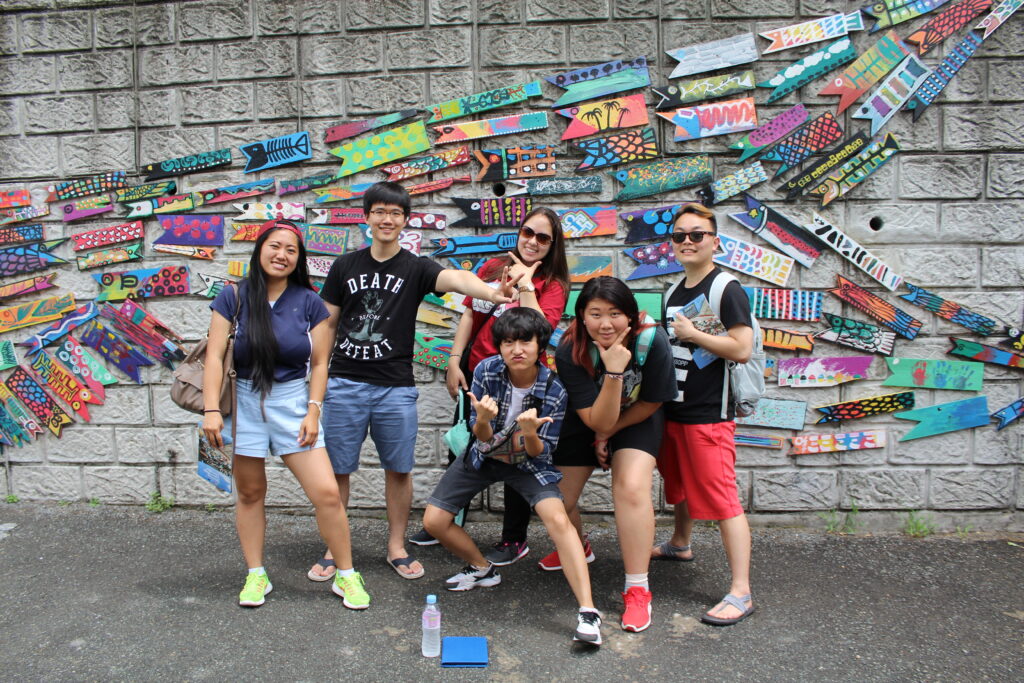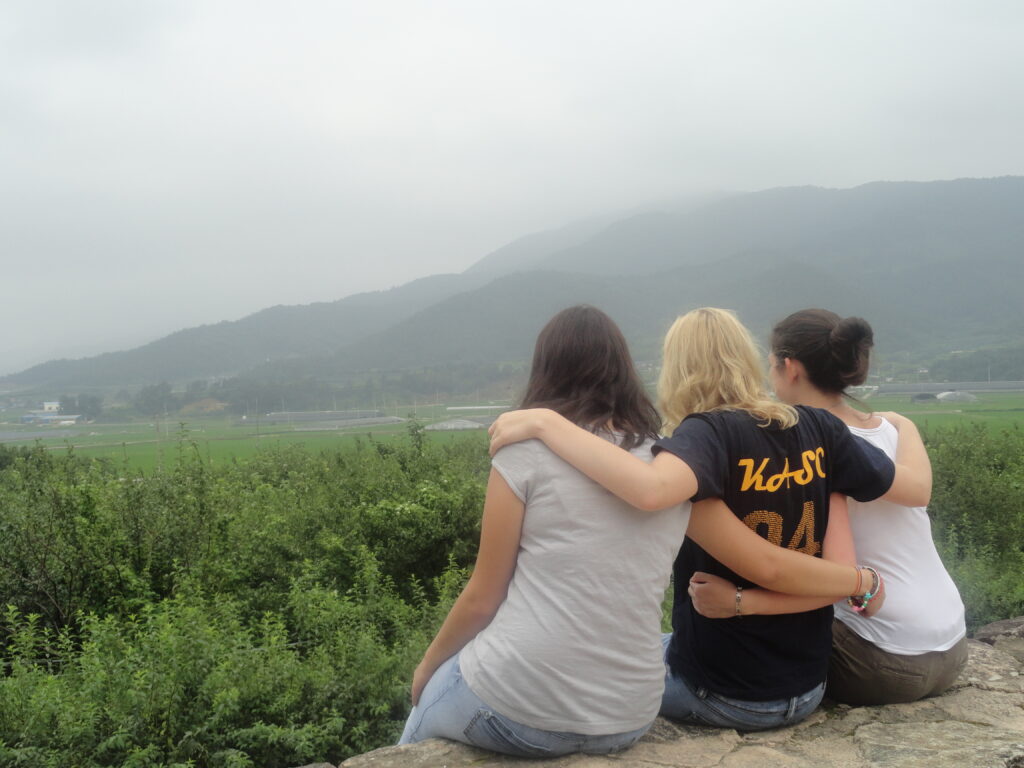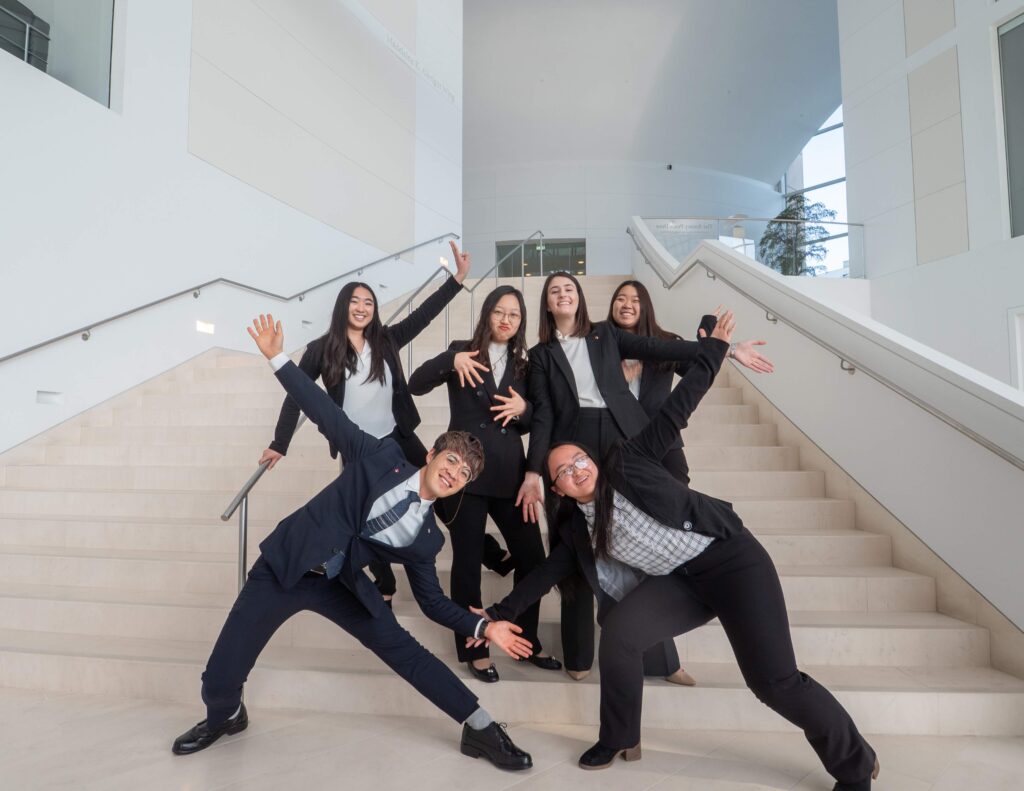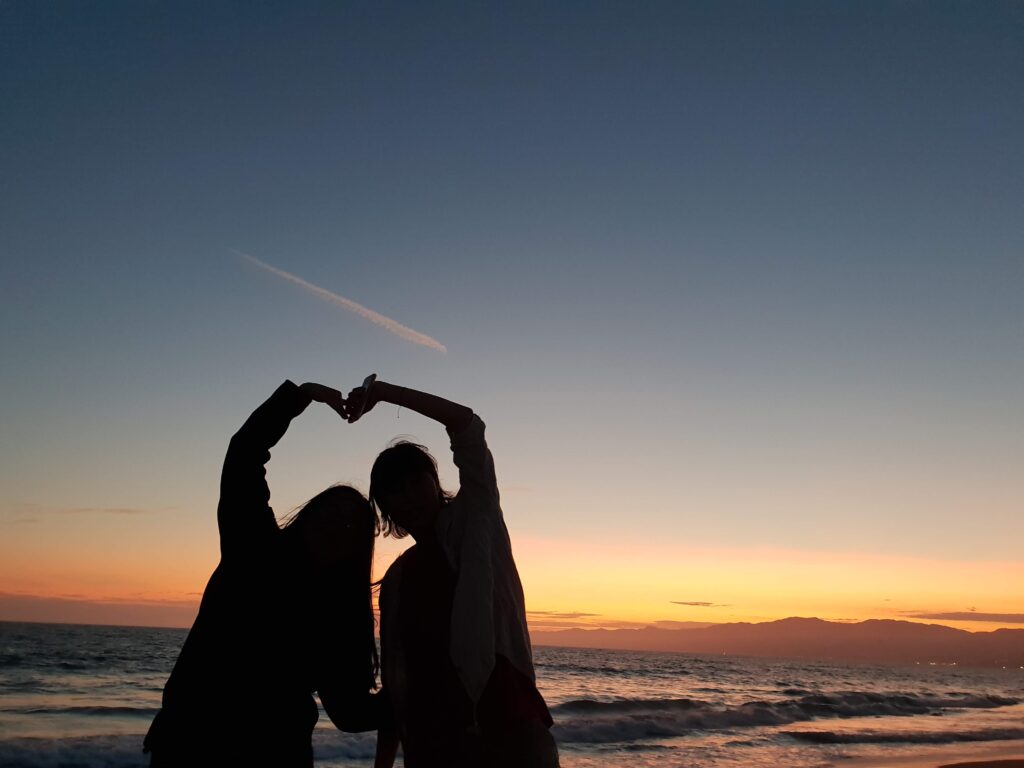What is the Korea-America Student Conference?
The Korea-America Student Conference (KASC), founded in 2008, is a student-led academic and cultural exchange program that brings together university students from South Korea and the United States. Each year, an equal number of students from both countries are selected to participate.
Delegates spend two weeks traveling, learning, and working together. Through academic discussion, cultural experiences, and leadership training, KASC helps students understand U.S.–Korea relations and develop skills to lead in a global context.
KASC is different from many other programs because it is fully run by students. The conference is planned and led by an elected Executive Committee of students from both countries.In 2026, KASC will take place in San Francisco, New Orleans, and Washington, DC.
“There are many ways to learn about Korea. However, there are hardly any opportunities to deeply interact with students, freely discuss contentious issues, and build lifelong relations with Korean and American students—KASC is one of these and a category of its own.”
John Kim
3rd KASC alumnus
Program Overview
Navigating the Future of the Korean-American Relationship in a Fracturing Global Landscape through Technology, Culture, Business, and Energy
Delegates will explore the future possibilities of the Korean-American Relationship in a time fraught with geopolitical instability and threats to longstanding relationships – looking through the lens of technology, culture, business, and climate cooperation.
📂 Application Opens: October 20, 2025
📁 Application Closes: January 3, 2026
📆 Conference Dates: July 25 – August 12, 2026
📍 Sites: San Francisco, USA, New Orleans, USA, & Washington D.C., USA
Roundatables
Each delegate joins a Roundtable (RT) — a small group focused on one theme related to Korea–U.S. relations. These groups meet throughout the conference to explore their topic through discussion, research, and collaboration. At the end, each group presents its findings at the Final Forum.
Roundtables are led by Executive Committee members and shaped by student perspectives. They combine academic learning with real-world relevance — perfect for students interested in international affairs, social change, or cross-cultural understanding.
Cultural Diplomacy, Art, Media, and Soft Power
Led by Gabrielle Drinkwine, USA
Soft power is the ability to influence others with attraction, culture, and values, rather than military or economic might and persuasion. Cultural diplomacy is a form of soft power, and may be defined as the deliberate and strategic exchange of ideas, values, traditions, and other cultural elements with the aim of fostering mutual understanding, strengthening relationships, advancing socio-cultural cooperation, and promoting national or international interests. It may be conducted by governmental bodies, private entities, or civil society organisations, each contributing to the broader objective of building trust and dialogue across cultural divides. This roundtable will specifically look at cultural diplomacy in the form of art, media, and popular culture.
Both the United States and South Korea are strong examples of nations that actively benefit on the global stage from the proliferation of their culture, their art, and their media. Recent examples of popular cultural diplomacy from South Korea include films such as K-Pop Demon Hunters and Parasite, K-Pop music such as Blackpink and BTS, and the overall Hallyu wave. The United States has long used cultural diplomacy as a method of soft power proliferation across the globe. Delegates in the Cultural Diplomacy, Art, Media, and Soft Power roundtable will look at how art and media increase understanding and interest in nations, and specifically how cultural diplomacy has benefited the Korean-American relationship.
Navigating Interdependence in International Business & Economics
Led by Bahar Hassantash, USA
In this era of economic transformation defined by evolving trade agreements, this roundtable delves into the critical dynamics of business relationships among interdependent nations. For instance, the longstanding economic partnership between the U.S. and Korea—previously consolidated in KORUS—was recently tackled as the U.S. adopts a more guarded approach to trade. Similar trends signal shifting supply chains, intensifying technological rivalry, and policy realignments; hence, participants in this roundtable will focus on the broader repercussions of global trade and economic cooperation in today’s ever-changing globalization landscape.
Does economic interdependence compromise strategic autonomy, and what does this tension mean for businesses? In conversations on U.S.-ROK relations, we explore the rise of emerging industries and shifting strategies for multinational corporations as they navigate uncertainty. By unraveling these transformations, our roundtable discussions work in tandem with our programming to foster a deeper understanding of how both nations confront policy challenges in an increasingly complex global economy.
Powering Tomorrow: Energy Policy and Nuclear Cooperation
Led by Marco Infosino
Energy is the lifeline of a modern economy, shaping not only economic prosperity but also national security, environment sustainability, and public health. This roundtable will explore how energy policy governs the production, distribution, and consumption of energy resources. As both nations navigate the challenges of energy transition, their collaboration, or lack thereof, will play a pivotal role in determining regional and global outcomes.
Delegates in this roundtable are invited to examine how the Korea–U.S. relationship can be strengthened through deeper cooperation in energy and nuclear policy. Discussions may explore themes such as energy security, climate change mitigation, technological innovation, and the ethical implications of nuclear power. By considering these issues through economic, political, and environmental lenses, participants will identify opportunities for joint leadership in building a sustainable and secure energy future.
Shaping Tomorrow: Technology & Artificial Intelligence
Led by Hyein Kim
As artificial intelligence (AI) transforms how societies innovate, govern, and connect, the Korea–U.S. alliance faces a moment of redefinition. Beyond trade and defense, technology now shapes the very language of trust between two nations—linking innovation to shared responsibility. From Silicon Valley’s startup labs in San Francisco to policy dialogues in Washington D.C. and the cross-cultural creativity of New Orleans, delegates in this roundtable will explore how AI cooperation can bridge innovation and integrity at every level: economic, ethical, and human. Through scenario-driven discussions and on-site exchanges, participants will engage directly with the ecosystems shaping global technology—debating how Korea and the U.S. can co-create frameworks for responsible innovation, secure and fair data use, and democratic digital governance in an age defined by generative AI. Together, we will ask not only what technology can do, but how it can serve people—and how Korea and the United States can build that future, side by side.
Delegate Experience
Cultural Exchange
From San Francisco to New Orleans and Washington D.C., delegates will experience daily life across the United States — forming lasting friendships across cultures. Whether you’re exploring SF’s Chinatown and Japantown, catching a jazz show in New Orleans, or exploring monuments in Washington D.C., every day brings something new.
Daily Life
You’ll attend roundtable sessions, site visits, and guest lectures, all led by your peers and shaped by current global conversations. Expect lively debates, collaborative research, and late-night group discussions that carry on long after formal programming ends.
World-Class Access
As a delegate, you’ll hear directly from ambassadors, generals, policy experts, journalists, and business leaders — many of whom don’t speak to student groups often. You’ll step inside embassies, government ministries, and corporate headquarters. It’s a level of access you won’t get from a classroom or a solo trip abroad — and a chance to grow your network with leaders shaping U.S.–Korea relations.
Housing & Meals
Delegates stay in safe, shared housing arranged by ISC. All accommodations are vetted for comfort, location, and accessibility. Meals are provided, and ISC works to accommodate dietary needs. An ISC staff member travels with each conference to provide support and respond to emergencies.
Academic Environment
KASC is intellectually demanding but not competitive. You’ll be asked to prepare readings, contribute to discussions, and collaborate on a final roundtable presentation. No grades — just curiosity, engagement, and mutual respect.
Social Time
Free evenings and group activities balance out the schedule. Expect karaoke nights, museum visits, informal bonding, and time to explore the city with your fellow delegates.
Meet the Executive Committee
Every year, the Korea-America Student Conference is planned and led by students — just like you.
The Executive Committee (EC) is a group of returning delegates from the U.S. and South Korea. They work together across time zones for months to shape the next conference — building the schedule, leading Roundtables, and coordinating logistics. During the program, they serve as on-site leaders and peer mentors.
KASC 19 is brought to life by this year’s dedicated student leaders:
- Hyein Kim 김혜인, Chair & Korea Outreach Coordinator, Northwestern University
- Marco Infosino, Treasurer & Information, Middlebury College
- Bahar Hassantash, Marketing & Recruitment, Georgetown University
- Gabrielle Drinkwine, Recruitment & Programming, American University
How to Apply
Eligibility
- Open to undergraduate and graduate students who are 18+ years old at the time of the conference.
- Must be enrolled at an accredited university either during the application period or in the fall semester after the program concludes.
- All majors and fields of study are welcome
- English proficiency is required (Korean is not required)
What You’ll Need
- Completed Online Application
- University transcript
- Optional: Resume or CV, One letter of recommendation, English Certificate
- $20 application fee or waiver code
Deadlines
Application Period
Opens: October 20, 2025
Closes: December 31, 2025 at 11:59 PM ET / January 1, 2026 at 1:59 PM KST
Timeline & Process
- After you apply, you may be invited to a short virtual interview within two weeks
- Final decisions will be announced in mid-to-late January
- If accepted, you’ll be asked to submit a $500 deposit to confirm your spot
Need Help?
Download the Applicant Packet (Coming Soon) for more details.
Have questions? Email KASC@iscdc.org or message us on Instagram @kasc_usofficial.
Costs & Scholarships
Participation Fee:
- $3,000 for students residing in Korea
- $2,500 for students residing in the United States
Thanks to our generous supporters, every accepted delegate automatically receives a scholarship of over $3,000–making the conference affordable.
| Your participation fee covers: Housing in each city All meals All in-country travel and logistics International flight between the U.S. and South Korea Cultural activities and academic programming Group insurance | What’s not included: A non-refundable $500 deposit is required to secure your spot if accepted (Deposit is a credit toward the total fee due). Travel to and from the starting and ending cities Personal expenses (souvenirs, snacks, etc.) |
We’re committed to making KASC 19 financially accessible. Each year, 50–60% of delegates receive full or partial funding through ISC’s Plant a Diplomatic Tree Scholarship, from their universities, or from our generous partners. Our Executive Committee is here to support you in securing the resources you need.
Start by visiting our Funding Your Conference page for tips and scholarship opportunities. Still have questions? Reach out to the ISC office at info@iscdc.org or contact the KASC team directly at KASC@iscdc.org. We’re here to help.
Make History with KASC
Established in 2008, KASC supports a deep bilateral relationship between the US and Korea. By exploring this relationship on multiple levels (politics, economics, culture, media, and more), students gain knowledge and confidence to discuss, debate, and co-create bilateral and international relations.
A unique feature of KASC is that an Executive Committee of students organize each Conference, working together across the Pacific throughout the academic year. The ECs also host Roundtables throughout the Conference, discussing critical issues outside the traditional classroom setting with other students from across the globe.
Have any questions?
Stay up to date with us on Instagram for the most current information about the 18th Korea-America Student Conference.
If you have any questions about the upcoming 18th Korea-America Student Conference, please don’t hesitate to reach out.
Past Conferences




Supporters
Thank you to the generous supporters of the Korea-America Student Conference:

2024 Scholarships Provided by:
- International Student Conferences Plant a Diplomatic Tree Scholarship
- University at Buffalo
- Jenny Town
- University of Hawaii – Manoa
- Indiana University
2024 Program Partners
- Korea Economic Institute America
- Korea Foundation USA
- The Korea Society
- The Asia Group
2024 Program Highlights
- Visit to the U.S. Department of State and briefing from the Bureau of East Asian and Pacific Affairs and Bureau of Educational and Cultural Affairs
- Multinational simulation and lunch provided by the Korea Economic Institute America
- Reception at The Asia Group with a speech by Ambassador Julie Turner, U.S. Special Envoy for North Korean Human Rights Issues
- Lecture and networking the Korea Foundation;
- Tour of the Old Korean Legation Museum
- The Korea Society
- United Nation Development Programme
- KASC X JASC Collaboration on Japan-Korea relations
- Presentation from the American Chamber of Commerce in Seoul
- American Diplomacy House & Final Forum